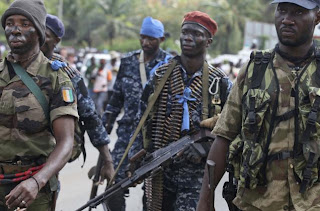The earthquake and tsunami that struck northeastern Japan on March 11, 2011, caused almost unimaginable damage and misery. In a surge of floodwater that lasted just two minutes, Japan lost nearly as many people as a proportion of its population as the United States did during the entire Vietnam War. The subsequent meltdown of the Fukushima nuclear reactors deepened the crisis.
But some see a silver lining to these dark tragedies. After 20 years of economic stagnation, the crisis could bring the Japanese together, catalyze much-needed reforms, and reverse decades of malaise. Many in the United States predict that the disaster will give a welcome boost to the U.S.-Japanese alliance. In an interview with Japan's national public television network on March 22, U.S. Secretary of State Hillary Clinton proclaimed, "Our alliance, which was already strong and enduring, has become even more so." Indeed, the U.S. response to the disaster showcased its lasting commitment to Japan, as well as the unique logistical and material capabilities that the U.S. military forces stationed in the Pacific can provide. In what was dubbed Operation Tomodachi (Operation Friendship), the United States mobilized some 20,000 service members to assist with relief activities. It was the largest joint operation in the history of the alliance, and it generated widespread public support in both countries.
Despite the warmth of that the moment, however, deeper trends portend a far less certain future for the U.S.-Japanese relationship. Japan is undergoing profound changes aimed at empowering the political leadership at the expense of its historically preeminent bureaucracy. But rather than bringing about a clean transfer of institutional authority, the reforms have triggered battles among politicians and between politicians and bureaucrats, creating a power vacuum and undermining the government's ability to make policy. Complicating matters further are Japan's piecemeal policymaking institutions, a hypercompetitive media environment, and an increasingly dire fiscal outlook. The result has been uncertainty and gridlock, which are affecting alliance policymaking and are unlikely to disappear in the years ahead.
Document of Word With Lines #
By Eduardo Isea
Referent | Line # | What does it Refer to? | Anaphoric or Cataphoric |
The | - | United States | Cataphoric |
Our | - | U.S. – Japanese Alliance | Anaphoric |
Its | - | show the commitment to Japan | Anaphoric |
its | - | bureaucracy | Cataphoric |
Which | - | The result | Anaphoric |
Document of Word With Lines #
By Eduardo Isea







 Germany's economic development was relatively late by European standards. Social scientists such as Alexander Gerschenkron and Barrington Moore have noted that its embrace of capitalist modernity and rise to power were predicated on a new pattern of authoritarian development -- in Moore's words, a "revolution from above." This meant using industrial policy to push development in those sectors that enhanced state power and simultaneously suppressing or co-opting all political opposition. In order to catch up with the more advanced economies of the West, the government protected heavy industries essential to the nation's military strength, as well as Junker agriculture, with tariffs.
Germany's economic development was relatively late by European standards. Social scientists such as Alexander Gerschenkron and Barrington Moore have noted that its embrace of capitalist modernity and rise to power were predicated on a new pattern of authoritarian development -- in Moore's words, a "revolution from above." This meant using industrial policy to push development in those sectors that enhanced state power and simultaneously suppressing or co-opting all political opposition. In order to catch up with the more advanced economies of the West, the government protected heavy industries essential to the nation's military strength, as well as Junker agriculture, with tariffs.




